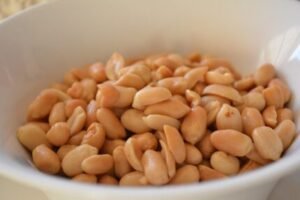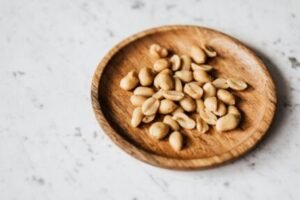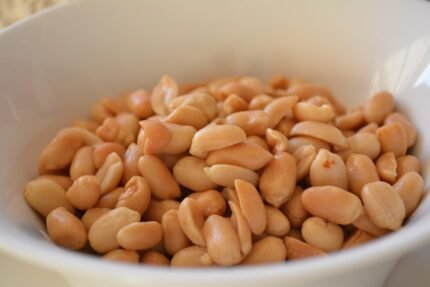Medically reviewed by Dr. Ramesh Gaddam, M.D. — Written by Sumalatha, D.N.H.E
1. Health Benefits
Boiled peanuts offer a range of health benefits due to their rich nutritional profile.

Here’s a detailed look at how they can contribute to various aspects of health:
Boiled Peanuts Can help for Heart Health

Boiled peanuts contain healthy fats, particularly monounsaturated and polyunsaturated fats, which are known to have a positive impact on cholesterol levels. These fats can help lower LDL (bad) cholesterol while increasing HDL (good) cholesterol, reducing the risk of heart disease.
Monounsaturated fats, found in abundance in boiled peanuts, help reduce inflammation and maintain the health of blood vessels.
Polyunsaturated fats, including omega-6 and omega-3 fatty acids, contribute to heart health by reducing blood pressure and lowering cholesterol levels. Together, these fats help protect against cardiovascular diseases.
Research has indicated that regular consumption of peanuts, including boiled peanuts, is associated with a lower risk of heart disease.
A study published in the Journal of Nutrition found that peanuts improve lipid profiles and reduce markers of inflammation, which are crucial factors in preventing heart disease.
Boiled Peanuts can help in Weight Management

Boiled peanuts are high in protein and fiber, both of which contribute to feelings of fullness and satiety. Consuming protein and fiber-rich foods helps control appetite by slowing down digestion, reducing the likelihood of overeating.
Compared to many other snack options, boiled peanuts are relatively low in calories.
A 100-gram serving of boiled peanuts contains about 318 calories, making them a satisfying and nutritious snack that can be included in a weight management plan.
Boiled Peanuts can help Digestive Health

Boiled peanuts are an excellent source of dietary fiber. Fiber is essential for maintaining a healthy digestive system as it adds bulk to the stool, making it easier to pass and preventing constipation.
The high fiber content in boiled peanuts promotes the growth of beneficial gut bacteria, contributing to a healthy gut microbiome.
A healthy gut microbiome is crucial for digestion, nutrient absorption, and overall immune function.
Boiled Peanuts have Antioxidant Properties

Boiled peanuts are rich in antioxidants such as resveratrol and flavonoids. Antioxidants help neutralize free radicals in the body, reducing oxidative stress that can damage cells and lead to chronic diseases.
The antioxidants found in boiled peanuts have been linked to a reduced risk of several chronic conditions, including heart disease, cancer, and neurodegenerative diseases.
By reducing oxidative stress and inflammation, antioxidants help protect the body from various health issues.
Boiled Peanuts can aid in Diabetes Management

Boiled peanuts have a low glycemic index (GI), meaning they cause a slower rise in blood sugar levels after consumption. Foods with a low GI are beneficial for people with diabetes as they help maintain stable blood sugar levels.
The high fiber and protein content in boiled peanuts further contribute to their blood sugar-regulating effects. Fiber slows down the absorption of sugar into the bloodstream, while protein helps stabilize blood sugar levels.
Including boiled peanuts in a balanced diet can help manage and prevent type 2 diabetes.
In summary, boiled peanuts are not only a delicious snack but also offer numerous health benefits. Their positive effects on heart health, weight management, digestive health, antioxidant properties, and blood sugar regulation make them a valuable addition to a balanced diet.
2. Nutrition
Nutritional profile of boiled peanuts per 100g.
| Nutrient Category | Nutrient | Amount per 100g | Benefits |
|---|---|---|---|
| Macronutrients | Calories | 318 kcal | Provides energy |
| Protein | 13.5 g | Muscle repair and growth, body maintenance | |
| Total Fat | 22.0 g | Essential fatty acids, energy storage | |
| Monounsaturated Fat | 11.5 g | Heart health, brain function | |
| Polyunsaturated Fat | 6.2 g | Reduces bad cholesterol levels | |
| Carbohydrates | 16.1 g | Sustained energy | |
| Fiber | 8.1 g | Aids digestion, maintains healthy blood sugar levels | |
| Micronutrients | Vitamin E | 2.9 mg (19% DV) | Antioxidant, supports immune function |
| Niacin (B3) | 6.0 mg (30% DV) | Energy production, brain health | |
| Folate (B9) | 240 µg (60% DV) | DNA synthesis, cell division, brain health | |
| Magnesium | 63 mg (16% DV) | Muscle function, nerve signaling, bone health | |
| Phosphorus | 110 mg (16% DV) | Bone and teeth health | |
| Potassium | 385 mg (11% DV) | Heart and muscle function | |
| Antioxidants | Resveratrol | 0.35 mg | Protects cells from damage, reduces inflammation |
| Flavonoids | Varied | Antioxidant properties, may lower the risk of chronic diseases |
3. Things to Watch Out For
4. Comparison with Other Forms of Peanuts
Health Benefits Comparison
5. How to Prepare Boiled Peanuts
For those interested in enjoying boiled peanuts at home, here’s a guide to traditional and healthy preparation methods:
Ingredients:
Raw peanuts, water, salt (optional).
Steps:
- Wash the raw peanuts thoroughly.
- Place peanuts in a large pot and cover with water.
- Add salt to taste.
- Boil for 2-3 hours until the peanuts are tender.
- Drain and serve warm.
Healthy Variations
- Low-Sodium Boiled Peanuts: Reduce or eliminate salt during boiling, or use salt substitutes.
- Spiced Boiled Peanuts: Add spices like garlic, chili powder, or bay leaves to the boiling water for added flavor without extra sodium.
Creative Recipe Ideas
- Boiled Peanut Hummus: Blend boiled peanuts with garlic, lemon juice, tahini, and olive oil for a unique dip.
- Boiled Peanut Salad: Mix boiled peanuts with chopped vegetables, herbs, and a light vinaigrette for a nutritious salad.
6. Clinical Studies on Boiled Peanuts
Several clinical studies have investigated the health benefits of boiled peanuts, shedding light on their potential impact on various aspects of health.
For instance, a study published in the Journal of Nutrition found that regular consumption of peanuts, including boiled peanuts, is associated with a lower risk of heart disease.
This study observed improvements in lipid profiles and reductions in markers of inflammation among individuals who consumed peanuts regularly.
Another study published in the American Journal of Clinical Nutrition examined the effects of boiled peanuts on weight management.
The study found that participants who included boiled peanuts as part of a balanced diet experienced greater feelings of fullness and satiety, leading to reduced calorie intake throughout the day.
This suggests that boiled peanuts can be a valuable addition to weight management plans.
7. Managing Peanut Allergies
It’s crucial to note that peanuts are a common allergen, and individuals with peanut allergies must exercise caution when consuming boiled peanuts or any peanut products.
Peanut allergies can manifest as mild symptoms such as itching or hives, but in severe cases, they can lead to life-threatening anaphylaxis.
As such, individuals with peanut allergies should avoid boiled peanuts altogether and carefully read labels to avoid accidental exposure to peanuts.
8. Sodium Reduction Strategies
Traditional boiled peanuts are often prepared with added salt, leading to high sodium levels that can elevate blood pressure and increase the risk of heart disease. To mitigate this, individuals can reduce or eliminate added salt during the boiling process.
Alternatively, they can opt for low-sodium varieties or rinse pre-packaged boiled peanuts under running water to remove excess salt.
These strategies help lower the sodium content of boiled peanuts while preserving their nutritional benefits.
9. Importance of Portion Control
Despite their health benefits, boiled peanuts are calorie-dense, and consuming them in excess can contribute to weight gain. Practicing portion control is essential when enjoying boiled peanuts as a snack or part of a meal.
A typical serving size of boiled peanuts is about 1/4 cup, providing a satisfying and nutritious snack without excessive calorie intake.
By being mindful of portion sizes, individuals can enjoy the health benefits of boiled peanuts while maintaining a balanced diet.
10. Variety in Preparation Methods
In addition to traditional boiling methods, there are numerous creative ways to prepare boiled peanuts that enhance their flavor and nutritional value.
For instance, individuals can experiment with adding spices like garlic, chili powder, or bay leaves to the boiling water for added flavor without extra sodium.
Alternatively, they can blend boiled peanuts with ingredients like garlic, lemon juice, tahini, and olive oil to create a unique boiled peanut hummus dip.
These variations not only make boiled peanuts more enjoyable but also offer additional nutritional benefits.
Final Thought
Boiled peanuts are a nutritious and versatile snack that offers numerous health benefits.
Whether you’re looking to improve heart health, manage weight, support digestion, boost antioxidant intake, or regulate blood sugar levels, boiled peanuts can be a valuable addition to your diet.
By understanding their nutritional profile and comparing them to other forms of peanuts, you can make informed choices about how to incorporate them into your meals.
Enjoy them in moderation and explore creative ways to prepare and flavor them for a tasty and healthful snack.
Frequently Asked Questions (FAQs)
People also searched frequently related to questions on Boiled Peanuts. Some of them are listed below.
Are boiled peanuts healthy for you?
Boiled peanuts are indeed healthy for you! They are packed with nutrients like protein, fiber, vitamins, and minerals.
These nutrients support various aspects of health, including heart health, weight management, digestive health, and blood sugar regulation.
What’s so special about boiled peanuts?
Boiled peanuts undergo a unique cooking process that makes them soft, flavorful, and nutrient-rich.
Boiling peanuts helps retain their nutritional benefits, including antioxidants, healthy fats, and fiber.
This cooking method enhances their digestibility and allows for better absorption of nutrients by the body.
How many boiled peanuts should I eat a day?
The ideal amount of boiled peanuts to consume per day varies depending on individual dietary needs and health goals.
As a general guideline, a moderate serving size is about 1/4 cup, which provides a satisfying snack without excessive calorie intake.
However, it’s essential to practice portion control and incorporate boiled peanuts as part of a balanced diet.
Does boiling peanuts remove protein?
Boiling peanuts does not remove protein; instead, it helps make the protein more digestible and bioavailable.
While some nutrients may leach into the cooking water during boiling, the protein content of boiled peanuts remains intact, making them a valuable source of plant-based protein.
Which is better, boiled or roasted peanuts?
Both boiled and roasted peanuts offer health benefits, but the cooking method may affect their nutritional profile differently.
Boiled peanuts retain more moisture and are softer, making them higher in certain nutrients like antioxidants and fiber.
On the other hand, roasted peanuts have a more concentrated flavor and may be slightly higher in calories and fat due to the roasting process. Ultimately, the choice between boiled and roasted peanuts depends on personal preference and dietary preferences.
What are the disadvantages of peanuts protein?
While peanuts are a nutritious source of protein, there are some potential disadvantages to consider. Peanuts contain allergenic proteins that can trigger allergic reactions in susceptible individuals.
Additionally, excessive consumption of peanuts or peanut products may contribute to weight gain and digestive discomfort in some people.
Is it OK to eat peanuts daily?
Yes, it’s generally safe to eat peanuts daily as part of a balanced diet. Peanuts offer numerous health benefits, including heart health, weight management, and blood sugar regulation.
However, individuals with peanut allergies should avoid peanuts altogether, and those with specific dietary restrictions or health conditions should consult a healthcare professional before making peanuts a regular part of their diet.
What are the 5 benefits of peanuts?
Peanuts offer a wide range of health benefits, including:
- Heart Health
- Weight Management
- Digestive Health
- Antioxidant Properties
- Blood Sugar Regulation
What is the negative impact of peanuts?
While peanuts offer numerous health benefits, there are some potential negative impacts to consider. Peanuts contain allergenic proteins that can trigger allergic reactions in susceptible individuals.
Additionally, peanuts are calorie-dense and high in fats, so excessive consumption may contribute to weight gain if not balanced with physical activity and portion control.
Who should avoid peanuts?
Individuals with peanut allergies should avoid peanuts and peanut products altogether to prevent allergic reactions, which can range from mild itching and hives to severe anaphylaxis.
Additionally, those with specific dietary restrictions or health conditions should consult a healthcare professional before consuming peanuts regularly.
Are peanuts good for men?
Yes, peanuts are beneficial for men’s health due to their nutrient-rich profile.
Peanuts contain essential nutrients like protein, healthy fats, vitamins, and minerals, which support overall health and well-being.
The protein and fiber in peanuts promote muscle growth, weight management, and digestive health, making them a valuable addition to a balanced diet for men.
What is the risk of peanuts?
The primary risk associated with peanuts is the potential for allergic reactions in susceptible individuals.
Peanuts contain allergenic proteins that can trigger allergic responses, ranging from mild symptoms like itching and hives to severe anaphylaxis, which requires immediate medical attention.
As such, individuals with peanut allergies should avoid peanuts and peanut products to prevent allergic reactions and ensure their safety.
Also Read:
7 health benefits of Java Plum for heart, diabetes and more
5 Potential Health benefits of Walnuts vs Pecans
Medically reviewed by Dr. Ramesh Gaddam, M.D.

General Physician, Diabetologist, and Critical Care Specialist.
Discover more from Health Build-Up
Subscribe to get the latest posts sent to your email.
